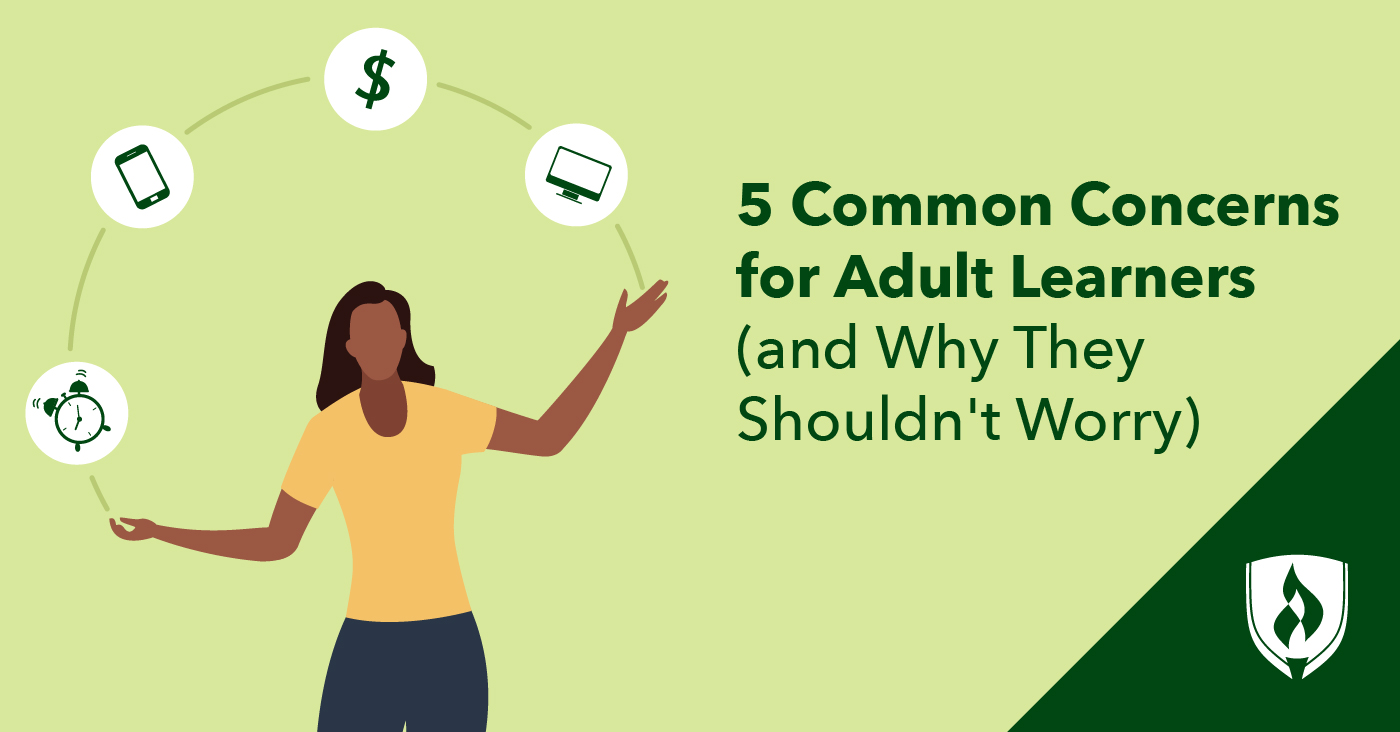5 Common Concerns of Adult Learners (And Why They Shouldn’t Worry)
By Kirsten Slyter on 12/13/2021

If you’re feeling apprehensive about going back to school as an adult learner, you’re definitely not alone. The “what ifs” and feelings of insecurity are much more common than you might think.
But guess what else is more common than you might think? Going back to school as an adult learner.
That’s right! There are millions of non-traditional students enrolled in colleges across the country, all in pursuit of finishing what they started, moving up the ladder or setting the stage for a career change.
It helps to know you’re not alone. But that doesn’t completely diminish the concerns you have about going back to school. Maybe you’re feeling a little rusty and don’t know how you’ll do getting back into an academic routine. Or maybe you’re not sure what to expect in an online classroom. No matter what’s spurring the concern, there’s good reason to believe you can handle the return to college.
To help you feel more confident as you embark on your educational journey, we connected with a few adult learners, who were once in your shoes, to hear about their worries and how they overcame them.
5 Common concerns for adults going back to school
1. Will I be able to afford school?
Karen Watts, author of Success in College: Strategies for New Grads and Non-Trads, decided to go back to school to improve her employability. Like many other adult learners, she was initially worried about how to finance her education. But student loans offered her the opportunity to make a payment schedule.
“Have a plan for payment and consider pay-as-you-go options instead of loans for part or all of your education,” Watts recommends. She also notes that in order to be wise with finances, it’s important to be very clear about what you hope to gain from furthering your education and set specific goals ahead of time. She suggests reviewing your progress after each semester to ensure you’re staying on track.
“Don't keep pouring time and money into the wrong program,” she says. Do plenty of research prior to enrolling so you’re sure the program aligns with your needs and goals.
If you’re concerned about the financial impact of going to school, take the time to research potential financial aid options. Between scholarships, employer-based assistance programs, grants and self-directed assessments, you may find avenues for improving the affordability of your education.
2. How will college fit into my schedule?
With a job, a family and other commitments, you don’t exactly have a lot of time on your hands. It’s no wonder you’re worried about adding another priority on your plate. But just remember that many busy adults like yourself have made it work—and so can you!
“Online learning technology, good time management skills and open discussions with my children helped with the time issues,” Watts says. She also recommended taking a time-management class or workshop and engaging friends and family to build a support network as you start this new chapter in your education.
Programs that cater to adults are generally aware that students have career and family obligations. At Rasmussen University, you’ll find many programs are offered in a competency-based education format that provides students with a greater control over their schedule and how they tackle their coursework.
3. Will technology issues throw me off track?
Not everyone grew up with a smartphone in hand. The classrooms and curricula of college have evolved over the years to incorporate new technologies. If you’re not the most comfortable navigator of the digital world, you might have some worries.
“Technology is a big concern for returning students,” Watts says. But the reality is, there are resources and help available if you need some extra assistance with technology. She adds that many colleges even offer workshops through their tutoring centers or libraries.
“My college offered a ‘computer boot camp’ where facilitators review many of the core tech skills students need to survive,” she says. “Tech is always changing and asking for assistance is the smart thing to do.”
4. Can I still learn?
It’s been a while since you’ve stepped foot in a classroom. You haven’t been in the learning mindset for quite some time, so it makes perfect sense to wonder if your mind is still as sharp as it once was. But just because you haven’t had your nose in a textbook doesn’t mean you haven’t been learning all of these years.
You’ve been a student of the world all along, adding new skills and knowledge to your arsenal each and every day. Along the way—through raising kids, managing a budget, doing your taxes, fixing the faucet—you’ve learned plenty, even if it isn’t listed on an academic transcript at this point.
The bigger challenge will be incorporating some new habits that will help set you up for success. Your routines will change a bit, but once you get the hang of things, it will come more naturally to you.
5. Will my loved ones support me?
Daniel Lavery pursued a career in law after an undergraduate education at the Naval Academy and a stint in the Vietnam War. Though he was passionate about his career change, his father, a war veteran himself, discouraged his decision.
With the support of friends who knew his potential, Lavery pursued a law degree anyway. He passed the bar exam and has since had a successful career as an attorney, including founding a civil rights practice.
“I learned not to always follow [family] advice, or anyone else’s who does not know your motivation, passion and determination,” he said. “If you have a passion to do something a few people don’t believe possible, you should not be discouraged. Seek out positive people if others discourage your dream. Even if no one sees you as [what] you want to become, follow your heart.”
The best thing to do is enlist the support of your family and friends from day one. Get them on board so they can help you reach your goals, as opposed to standing in your way.
It’s not too late to go back to school
Your concerns about going back to school are definitely warranted, but it’s never too late to earn your degree or pursue your passion. Whether you want to pursue an education with the hope of making a career change or just learn new skills, there’s no better time to start than now.
After reading the advice from adult learners who have gone before you, you should be feeling more confident than ever about conquering those fears.
If you want to read more stories about resources adults learners can utilize, check out our article “11 Surprising Student Resources You Didn’t Know Rasmussen University Offered.”
EDITOR'S NOTE: This article was originally published 2016. It has since been updated to include information relevant to 2021.




